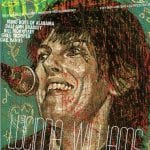Greg Trooper – a New Jersey yankee in King Acuff’s court
A singer-songwriter who isn’t that kind of a singer-songwriter, Greg Trooper has finally come to know how the music industry doesn’t work. So it kinda figures that by moving to Nashville, he’d find the type of record deal he spent 15 years looking for in New York.
Despite this somewhat roundabout approach, Trooper’s fifth release, Straight Down Rain (released in April on Eminent Records), is a plain-spoken, straight-ahead beauty that showcases a dozen prime examples of his self-described “loud folk.” Deftly blending sounds drawn from a classic pool of ringing folk-rock (Byrds, Dylan, the more earthbound side of Rubber Soul) with clear-eyed, hard-scrabble lyricism born of the Texas outlaw-country school, Straight Down Rain fairly reeks of an artist whose time has, at long last, arrived.
Born in 1956 in Neptune, New Jersey, and raised in nearby Little Silver, Trooper was a “confused kid” whose earliest musical influences were singing cowboys and Satchmo. “As a little kid, I was really into cowboy songs,” Trooper says, “but Ken Burns’ Jazz series on PBS reminded me that I went through a time where I had this huge thing for Louis Armstrong.
“When I’ve done interviews in the past, I’ve tended to talk about the music that related directly to what I ended up doing, but it struck me when I was watching that show that Louis had meant a lot to me when I was younger, too. My parents bought me a bugle because I was so into him, and I had his records. It was sort of that raw emotion that he delivered that really turned me around, you know?”
Trooper cites Otis Redding’s The Dock Of The Bay, along with the Beatles’ Second Album and their self-titled double album (a.k.a. the white album), as major early-movers. “And then my brother, who is two years older than me and was always feeding me cool stuff, showed me the light with Bob Dylan,” Trooper chuckles, “and that started to change everything.
“Dylan really showed everybody there could be such a thing as a singer-songwriter, you know, so in the early-’70s, I got deep into that. And it was singer-songwriters that introduced me to country; I kinda went in the back door. But once I was there, my favorites became Hank Williams and Merle Haggard.”
Trooper got his first guitar in junior high, then knocked around in duos and in a band called the Ravioli Brothers (“kind of an East Coast version of the Flying Burrito Brothers; we did mostly Texas music”). At age 17, Greg and his friend Richard Scott left Jersey and headed west.
“We thought we were on our way out west to go play gigs,” laughs Trooper, “but we kinda got stuck in Kansas, of all places. From there, it was back to Jersey, then down to Texas, and Richard kinda split from there, and I stayed in Austin for about a year.
“It was a really, really incredible time in Austin,” Trooper recalls. “This was around 1976. And I went there purely for the music, you know, but some other friends moved down there with me, and I was really not a very together kid at the time. I was drinkin’ and doin’ whatever I could do. No different than anybody else, when you think about it, but it really interfered with gettin’ to where I wanted to be musically.
“That was a heavy life down there. It was only about a year, but at that age, a year takes up a lot of space — it’s equivalent to, like, five or six years now. We were sponges back then, and I wasted a lot of my time, but that’s part of the process, I guess.”
Trooper headed up to Lawrence, Kansas, and over the next few years worked at the University of Kansas and at a record store. He managed to get a couple years of classes in and, most importantly, put his first real working band together. With a song list made up primarily of Van Morrison covers and Trooper’s growing cache of original material, the 11th Street Rhythm Method played Lawrence, Kansas City and around the Midwest for almost two years.
“By 1980, I’d had enough of college, and I moved to New York City,” Trooper continues. “I was just totally motivated to write songs and make records. I found musicians and made friends there and started playing right away. It’s a much smaller world than you would think. You do a certain kind of music, and that world’s gonna connect itself to you no matter where you are, and it’s the same in New York.”




